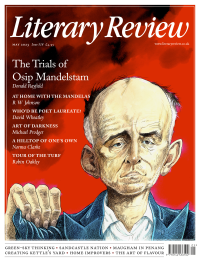Tanya Harrod
Gaudier-Brzeska for the Masses
Ways of Life: Jim Ede and the Kettle’s Yard Artists
By Laura Freeman
Jonathan Cape 400pp £30
Laura Freeman’s book opens with a fictional account of an undergraduate visiting Kettle’s Yard for the first time. It chimes with all the stories of going there I have heard from Cambridge students of a certain age. Between 1958 and 1973, its creator, Jim Ede, offered an informal artistic induction to his young visitors, in effect teaching them how to live with modern painting and sculpture. Kettle’s Yard gave the lie to the belief that the avant-garde could never be twinned with the domestic, that great art had no place in the home. With luck you stayed for tea, meeting Ede’s Scottish wife, Helen, more down to earth than her husband. Cycling back with a Ben Nicholson in your handlebar basket, on loan for a term and to be kept out of the sun, was the cherry on the cake.
It is difficult to find anyone critical of Ede’s project, now under the stewardship of Cambridge University. A rare case was the acerbic commentator on design and architecture Peter Dormer, who died in 1996. He had grown up on a deprived council estate in north Cambridgeshire and at first had loved ‘oh-so-beautiful’ Kettle’s Yard. But he later turned against it with a vengeance, writing angrily in 1986, ‘I believe that the “spirituality” of Kettle’s Yard with its tasteful piles of pebbles on polished oak side tables, its discreet ceramic bowls and bits of sculptural bric-a-brac and Alfred Wallis paintings, rings false.’ Dormer disliked the ‘over-conscious domestic aesthetic’, seeing it as part of ‘an embarrassing and deeply moralising and familiarly English landscape’. Kettle’s Yard reminded him of Snape Maltings, of smug performers of early music and of privileged characters in Iris Murdoch novels.
Ede, who by the time of Dormer’s Lucky Jim-esque outburst had left Kettle’s Yard to the care of professional curators, might have been surprised by his anger and by the suggestion of privilege. Born in Wales in 1895, the son of a teacher and a solicitor, Ede was

Sign Up to our newsletter
Receive free articles, highlights from the archive, news, details of prizes, and much more.@Lit_Review
Follow Literary Review on Twitter
Twitter Feed
In 1524, hundreds of thousands of peasants across Germany took up arms against their social superiors.
Peter Marshall investigates the causes and consequences of the German Peasants’ War, the largest uprising in Europe before the French Revolution.
Peter Marshall - Down with the Ox Tax!
Peter Marshall: Down with the Ox Tax! - Summer of Fire and Blood: The German Peasants’ War by Lyndal Roper
literaryreview.co.uk
The Soviet double agent Oleg Gordievsky, who died yesterday, reviewed many books on Russia & spying for our pages. As he lived under threat of assassination, books had to be sent to him under ever-changing pseudonyms. Here are a selection of his pieces:
Literary Review - For People Who Devour Books
Book reviews by Oleg Gordievsky
literaryreview.co.uk
The Soviet Union might seem the last place that the art duo Gilbert & George would achieve success. Yet as the communist regime collapsed, that’s precisely what happened.
@StephenSmithWDS wonders how two East End gadflies infiltrated the Eastern Bloc.
Stephen Smith - From Russia with Lucre
Stephen Smith: From Russia with Lucre - Gilbert & George and the Communists by James Birch
literaryreview.co.uk